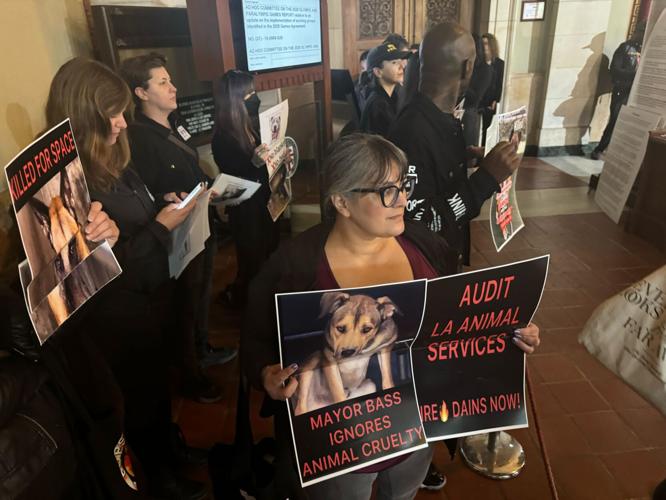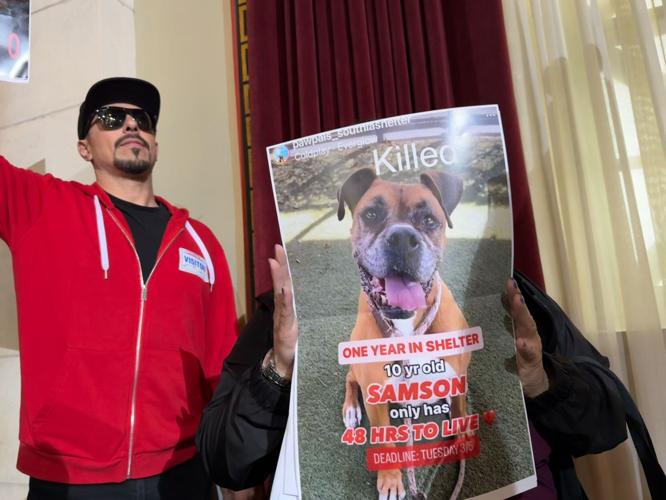(Editor’s note: This article ran on March 15, in Westside Current and is reprinted with permission click here.)
By JAMIE PAGIE
Amid a critical overcrowding crisis in Los Angeles animal shelters, advocates and concerned individuals rallied at City Hall on March 15, demanding increased transparency and accountability from city officials.
The city’s Department of Animal Services is currently grappling with a significant challenge, as thousands of dogs exceed the available space in the city’s six animal shelters. This longstanding issue has resulted in inadequate housing conditions, with large dogs being forced to share cramped kennels and others placed in cages along shelter hallways and waiting areas.
“I’m here today to draw attention to the deplorable, inhumane conditions animals endure at the hands of the agencies you oversee,” said Susan Collins, a community member and recent contender for the senate, delivering a powerful critique to the council.
“But my comments are really more for the people in attendance because they are kind, compassionate, caring people who foolishly believed that the same people who have knowingly cultivated the identical deplorable, inhumane living conditions—resulting in thousands of deaths every year for the people of Los Angeles—would somehow do better for animals.”
Megan Ignacio, spokesperson for the Department of Animal Services, emphasized the department’s commitment to a no-kill policy aimed at saving “healthy and treatable animals.” Despite this policy, the department acknowledges the growing challenge of overcrowding, which has persisted for nearly two decades. Critics argue that the city’s approach lacks a strategic plan to address the root causes of the overcrowding.
“We have a GM that’s been in the job for over nine months, and she wasn’t even hired with a strategic plan,” said Valleri Ianniello of Women United for Animal Welfare.
In response, the Department of Animal Services asserts it has “worked urgently to lower overcrowding numbers and reduce euthanasia rates,” urging residents to adopt, foster, volunteer, and donate.
In October, the City Council passed a moratorium on new breeding permits, hailed as a key step towards alleviating shelter overcrowding. However, action on this front has yet to materialize.
Moreover, advocates are pressing for more decisive measures, especially in bolstering spay and neuter initiatives. “Our main demand is transparency about the ongoing crisis in shelters, to make it clear that dogs are being euthanized due to lack of space,” Ianniello emphasized.
Ianniello pointed out a significant flaw in the shelter’s approach to animal care, noting the absence of requirements for walking dogs or providing any form of enrichment post-intake.
“The resulting lack of interaction and exercise is a major issue. Given that volunteers, constrained by their own work schedules, are the main ones taking dogs for walks, it’s led to situations where some dogs haven’t been walked for months. This neglect not only causes behavioral problems but also increases the chances of these animals being euthanized to free up space,” Ianniello explained.
Supporting this claim, data from the LA Controller’s office reveals a concerning statistic: 350 dogs in LA shelters haven’t been walked in nearly two weeks, and 104 have not been walked in three weeks.
Ianniello’s recent visit to a shelter painted a grim picture of the conditions: “It’s disgusting there. If you’ve been to South LA, you can’t even walk inside. The smell is so pungent, and it’s an outdoor kennel. I was just literally there last week…and not one staff person outside. It was noon on a Tuesday.”
People for Ethical Treatment of Animals (PETA), who was also in attendance on Friday, stated that animals have been reportedly dumped on the streets when they’re turned away by staff at Chesterfield Square/South L.A.’s animal shelter.
The animal group says the shelter staff have refused to accept stray animals and instructed residents to abandon animals on the streets where they found them. PETA and others say they’ve begged the city to intervene, but despite “mounting evidence” that Los Angeles Department of Animal Services’ policies “aren’t working.”
“LAAS has washed its hands of the crisis it helped create by refusing to enforce the city’s spay/neuter ordinance and allowing the homeless animals it turns away to flood L.A.’s streets, where they often suffer and die painfully and slowly,” PETA Senior Vice President Lisa Lange said in a statement. “PETA is calling on Mayor Bass to actually do her job and remind city shelters of theirs: to provide shelter to all.”
In an effort to combat some overcrowding issues, Councilwoman Traci Park and Councilwoman Eunisses Hernandez, the same authors of the breeding moratorium, proposed a motion on Friday for a comprehensive report on the city’s foster care program. The report aims to evaluate the current system, identify ways to re-engage former foster caregivers, and streamline the process for moving animals from the streets to foster homes within 30 days.
“We’re just here for change. We’re not a group of bullies,” said Ianniello. “We’re a group of advocates that want better for our animals. We’re here because we believe our animals deserve better, and it’s emotional because they can’t fight for themselves.”



